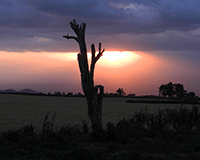We are running out of farmland in developed markets. So James Cairns, associate director of International Farmland at Savills, recommends Sub-Saharan Africa as the new frontier.
“The bottom line is that there is a core necessity to feed the population. We have to find farms elsewhere and we have to make them productive, and therefore they have also got to be commercial,” he says.
According to The World Bank Report Growing Africa: Unlocking The Potential Of Agribusiness, Africa has more than half of the world’s fertile yet unused land. “The appeal is you can get hold of large-scale land for virtually nothing,” says Cairns.
He adds that investors should get in within the next three years while land prices are cheap. Although the prices are appealing, he stresses that an understanding of the African market is essential: “There needs to be some emotive interest or passion to want to go to Africa, because it is hard work and capital intensive.”
According to Cairns, Zambia, Mozambique, Tanzania, Uganda, and Ghana are the best locations, with Zambia as the best option for new investors who are looking to get in on secondary market opportunities.
Over the last 10 years, farmland has increased significantly from virtually nothing to some farms being sold for $12,000 Ha. He says: “In Zambia there is a real established farming and agricultural community to support the supply chain. If you are looking for the exposure and capital value uplift, Zambia is undoubtedly going to keep rising in value.”
Although there are risks, with good management and an understanding of the market, there is an opportunity to acquire large productive farms that are likely to significantly increase in capital value over time and provide good income returns once established.
The rising population and demand for food commodities is the driving the commercial agricultural market in the international sphere. Not only are there more mouths to feed, but there is higher demand for a meat-rich diet which drives all sectors of agricultural production.
According to Cairns, the key to a successful investment is solid infrastructure with buildings, roads and irrigation. It is also essential to be sensitive to the local community and to have a strong management team that understands the local market.
African farms produce for international regional and local markets, and investments in land can also help sustain local communities. For those that are not familiar with the African market, Cairns advises a joint venture, either share farming or a leaseback with an established operator.
Africa is a romantic and exciting investment. The scenes are as beautiful as those in Out Of Africa and for those willing and prepared, it is worth the risk. “The perceived risks are much more than the actual risks when done properly,” says Cairns, “Africa is stunning, and if you want to buy into the African dream, then there is no better way to do it than a good farm.”
Emily.Wright@estatesgazette.com
INTO AFRICA SPECIAL FEATURES











